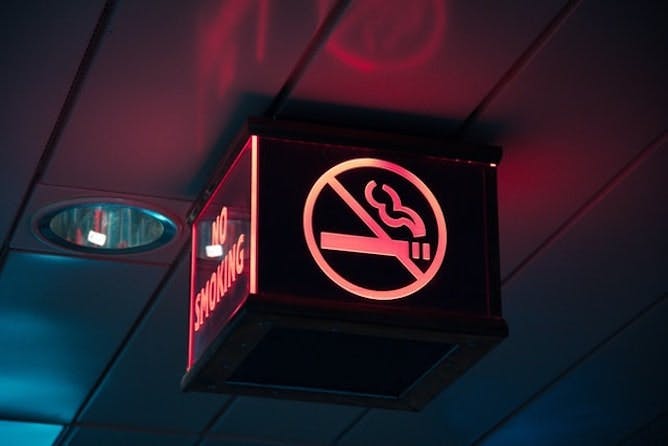
Around 15% of UK adults smoke, and plenty of them are also drivers or looking at taking lessons soon. If that’s you, we’re here to arm you with the information to stay on the right side of the law—particularly as the rules for smoking in cars change depending on the circumstances.
Alternatively, if you’re trying to keep up a New Year’s resolution or in need of motivation to quit smoking, we’ve covered plenty of topics below that could help motivate you to stay on track.
Is it illegal to smoke while driving?

It is not illegal to smoke while driving, although there are laws against smoking with kids in the car, which we’ll discuss in more detail below.
However, smoking can distract drivers, as noted in the Highway Code Rule 148:
Safe driving and riding requires concentration. Avoid distractions when driving or riding such as
- loud music (this may mask other sounds)
- trying to read maps
- starting or adjusting any music or radio
- arguing with your passengers or other road users
- eating and drinking
- smoking
Not only can it cause you to take one (or both) hands off the wheel—not ideal—your mind may also wander from the roads in front. You need to be fully aware of your surroundings so that you can react to other vehicles’ actions and changes in conditions.
So, despite it being technically allowed, you can still be prosecuted for smoking while driving. If it leads to your standard of driving ‘fall[ing] below what would be expected of a competent and careful driver’, you can be charged with ‘careless, or inconsiderate, driving’ under section 3 of the Road Traffic Act 2003.
More seriously still, you may even fulfil the criteria for driving dangerously—meaning you’re presenting a ‘danger either of injury to any person or of serious damage to property’—as a result of lighting up behind the wheel. This charge holds high penalties.
If you’re prosecuted under either the careless or dangerous driving provisions in the Road Traffic Act 2003, you could:
- Get fined
- Receive points on your licence
- Face a driving ban
- Be sent to prison if you end up killing someone in a collision
Driving law
Not 100% clear on driving laws? Check out the rules on these commonly misunderstood scenarios.
- Is it illegal to eat and drive?
- What happens if you get six points on your licence within your first two years of driving?
Smoking in cars with children

It is illegal to smoke in the car with any under-18s present in England, Scotland, Wales and Northern Ireland. This law, detailed in the Children and Families Act 2014, section 95, aims to protect kids from the dangers of secondhand smoke. They are especially at risk, due to their immune systems, lungs and airways not being fully developed.
You're not allowed to smoke in a vehicle with children, even if you:
- Have the windows or sunroof open
- Sit wholly or partly in the car while it’s stationary with the door open
You're only allowed to smoke with children in the car if you:
- Are in a convertible car and the roof is fully down
- Vape e-cigarettes
What is second-hand smoke?
Smoke inhalation is dangerous to others because it can cause the same types of diseases, like lung cancer and heart disease, as if the person has smoked themselves. There is also an increased risk that children will develop asthma and other conditions if they regularly inhale passive smoke. The restrictive size of a vehicle makes secondhand smoke a particular danger—even if the windows are open.
Bear in mind that smoke can linger in a ventilated space for up to three hours, meaning that anyone using the car after you’ve had a cigarette is being exposed to dangerous toxins even if you can’t smell them anymore.
Is it illegal to vape and drive?

You're still allowed to vape while you’re driving regardless of whether there are child passengers or not. The dangers of passive vaping are thought to be far reduced compared to those of secondhand cigarette smoke. That’s because e-cigarettes don’t produce tar or carbon monoxide like their tobacco counterparts.
However, this doesn’t stop vaping from being physically and cognitively distracting when driving. Your hands are occupied, your mind may drift, and the steam could affect your levels of observation.
If you’re struggling to quit smoking, the NHS advocates vaping as a much safer alternative.
Smoking on driving lessons
If you need to take a cigarette break, tell your instructor. You’re not allowed to smoke or vape in the vehicle during your lesson, but you can stop if you need to smoke outside the car. Just be aware that this will eat into your learning time. Your instructor is not allowed to smoke during your driving lessons either.
Am I allowed to smoke when driving a vehicle that doesn’t belong to me?
This all depends on the deal you have with the owner of the vehicle. There’s no rule explicitly prohibiting smoking in a vehicle that doesn’t belong to you (except in work vehicles), but there may be other laws that stop you—for example, if it means you are in breach of a contract.
Worried about lending your car to someone?
If you’re lending a car to someone and you’re concerned that they or their passengers might smoke in it, the best thing to do is to have a signed, written agreement. Over-the-top? It might seem so, especially if the person is a good friend or family member. But it will let them know how serious you are, which will likely be enough to stop them smoking in your car.
In fact, making a short DIY contract is always a good idea. Particularly if someone is borrowing your vehicle regularly or using it for a long journey—regardless of their smoking status. It helps you both know where you are. For instance, if they crash and you have to make a claim on your insurance, you’ll need to decide:
- Which of you pays the excess fee
- How to approach future financial detriment, as you’ll likely lose your No Claims Bonus and have to pay more for your insurance for the next few years
It’s much easier to have these things figured out beforehand because dealing with finances is an emotive topic—and even more so when you take into account the stress, injury and damaged property from a collision.
Include:
- Your terms, eg. no smoking in the car
- Your intention for the document to be legally binding
- Agreement on financial implications of a crash
- Whether you expect any payment in return for borrowing the car, eg. their share of the insurance, petrol contributions or general wear and tear
Make sure you both:
- Read and understand the agreement
- Sign and date it
- Keep a copy
Ideally, a document like this just keeps things clear between the two of you. But if things go south and get out of hand, you may well be able to rely on it as a contract in court.
Smoking in a work vehicle
It is illegal to smoke in a work vehicle that other people use. This covers a lot of work vehicle scenarios, so it's always safest to assume it's a blanket ban. You and your company could be fined if you are caught lighting up.
The exception maybe if you are the only person ever to use that vehicle. However, many companies will have a policy forbidding smoking in a work vehicle and, if this is the case, you'd be in breach of contract.
You'll be allowed to vape—unless your company policy prohibits it—but beware of distraction.
Smoking in a company car for personal use

If you receive a vehicle as part of your benefits package through your employment and use it for mostly personal use, you may be allowed to smoke in it. Check your company policy and any contract that you are asked to sign.
Smoking in hire cars
Car hire companies will not permit you to smoke in the car you’re provided; this will be stipulated in the document you sign before being allowed to drive the vehicle. If you are found to have ignored the rules, you'll probably be charged a big fee. There are several reasons for this:
- Other customers would complain about the smell of smoke, spoiling the company's reputation
- You’re more likely to be distracted, and therefore get into an accident if you light up when driving, making you more of a risk in terms of insurance
- The car would have to be professionally cleaned or valeted after you use it
If your employer pays for you to hire a car for work purposes, it would depend on your company’s policy as to whether they’d cover any cleaning charges you incur as a result of smoking, or pass the cost onto you.
FAQs
Will my car smell if I smoke cigarettes in it?
Smoke has a very powerful odour. Even if you keep windows open when you light up, your vehicle will still absorb the smell—and even if you don’t notice it yourself, others will. This will certainly get you into trouble if you try to get away with smoking in a vehicle when you’re not allowed, and could affect your ability to sell your car for a good price in the future.
The reality is that to eliminate the smell of smoke, you’ll need to get your upholstery and probably your whole air conditioning system professionally cleaned.
Is my driving instructor allowed to smoke during my lessons?
Your instructor is not allowed to smoke in the car during a driving lesson, as it is a work vehicle and others—their pupils—also use the vehicle. It is also bad practice for them to take cigarette breaks during your lesson time unless it is a particularly long lesson and you have given your permission. You should not have to sit next to an instructor who smells of smoke if you don’t want to.
If you’re unhappy with the conduct of your driving instructor and don’t feel comfortable raising the issue with them, you can always speak to the driving school that you booked your lessons through.
I’m 17 years old—can I smoke while driving?
You are allowed to smoke in the car as a 17-year-old, so long as there are no other under-18s present. So if you are driving with friends who are also 17, it is illegal for you to light up, even if your friends themselves are smokers. It's also against the law for them to smoke with you in the same vehicle.
How can I quit smoking?
Giving up smoking isn’t an easy task, so we recommend you look to the experts for tips on how to achieve it. Here are some useful resources from the NHS:
Subscribe for driving advice, offers & more
We'd love to let you know about our courses, news and offers via email. You may unsubscribe at any time.
Star Genie Limited trading as PassMeFast. Company number 10093359
Copyright © 2024 owned by Star Genie Limited
PassMeFast, Blue Tower, MediaCityUK, Salford, M50 2ST

